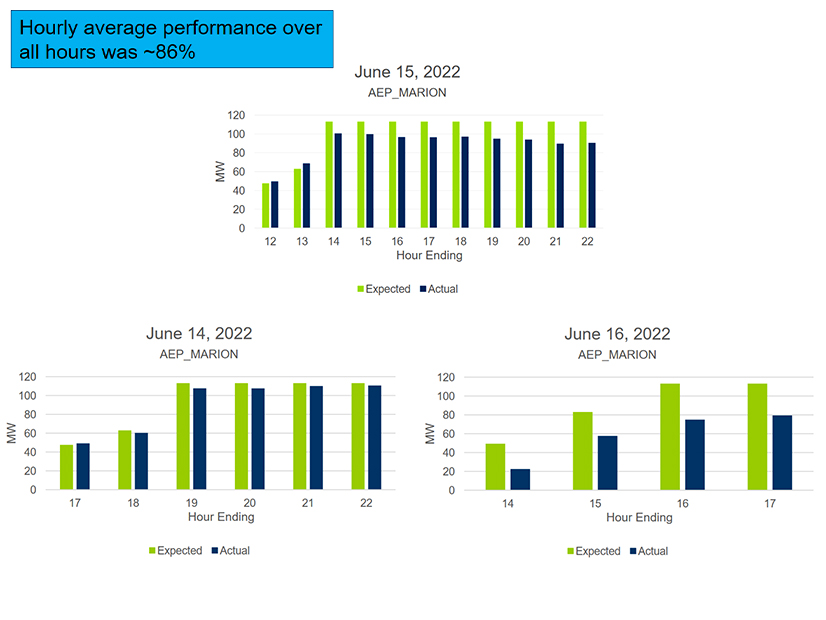
Revisions to IROL CIP Issue Charge Rejected
The PJM Operating Committee last week rejected modifications to its issue charge exploring the compliance costs for generators determined to be critical to maintaining interconnection reliability operating limits (IROLs) under NERC’s Critical Infrastructure Protection (CIP) standards.
The proposed revisions from the Independent Market Monitor, which received 22% support, would have rewritten a portion that states that facilities designated as critical “may face significant incremental compliance costs with no existing means to recover the costs” to instead say that they may face “incremental compliance costs.” They would have also rephrased a passage charging stakeholders with examining “how” costs should be recovered to “whether” they should be. The revisions would have also laid out steps for exploring a cost-of-service solution or allow for “cost recovery under current market mechanisms.”
Stakeholders were largely concerned that the language would lead to generation owners having to recover costs through their market offers, reducing their competitiveness and potentially forcing facilities identified as critical to retire.
“It would seem to me that, given all those issues at play, if we tried to recover these through a market mechanism of any sort, there’s no guarantee that any of those costs would be recovered,” said Paul Sotkiewicz of E-Cubed Policy Associates.
Jim Davis of Dominion Energy said the annual nature of the IROL review means that a generator could be designated critical one year, be required to reach compliance in approximately that long and then the following year no longer be considered a critical facility, making it even harder to recover costs.
Deputy Monitor Catherine Tyler said the language does not point to a specific solution. If the outcome were to be that generators recover the costs through the market, she argued that it would not be a significant enough expense to impact a facility’s competitiveness.
“We don’t think this is something that’s going to push these resources out of the market in any way; it would simply allow for an efficient way to take them into account in the market,” she said.
Review of Lessons Learned from June Outages in Ohio
PJM discussed lessons learned and improvements to procedures and training that can be made based on experiences from a storm in mid-June that left 240,000 customers in Ohio without power through a series of load-shedding orders between June 14 and 16. (See Vegetation Eyed in AEP Ohio Outages Following Storms.)
Donnie Bielak, PJM senior manager for dispatch, said the event represented the first time PJM staff experienced overlapping overloads and multiple cascading outage conditions. The closest incident he could point to was the cascading failure seen in California in 2011.
“This is the first time we’ve had our eyes on this kind of analysis,” he said.
A review of the incident recommended enhancing training to dispatch staff to include simulations with multiple overloads and potential cascading conditions, consider the tools used by dispatch staff to evaluate events with the potential for cascading outages, and improving dispatch procedures for additional clarity and decision-making guidance for pre-contingency load shedding.
PJM’s Jack O’Neill also reviewed the performance of demand response throughout the event, with analysis showing it performed at approximately 86% over the 21 hours it was called upon.
Fuel Supply Update
Production and inventories of coal and natural gas are improving despite price volatility, while inventories of distillate and residual fuel oil remain well below their five-year averages.
PJM Principal Fuel Supply Strategist Brian Fitzpatrick said congressional legislation that averted a railroad strike improves concerns about transportation of coal, but it’s unclear if ongoing delivery inefficiencies that have been seen over the past few years will be alleviated. Coal prices remain high, reflecting strong demand worldwide, while production is 3% higher than this time last year.
Natural gas is currently seeing record production levels, bringing inventories to 2.4% below the five-year average — a turnaround over reserves being at the lower end of the five-year range in recent months.
Inventories of distillate and residual fuel oil have both remained below the five-year range throughout the year, with approximately 30 to 40 days of supply currently available, Fitzpatrick said.
Other OC Action
Stakeholders endorsed manual revisions to clarify the internal network integration transmission service specific to cross-border processes, as well as administrative cleanup. Jeff McLaughlin said the revisions do not have an impact on rules or processes. The revisions still require the approval of the Markets and Reliability Committee, which is set to vote on the language in January.

